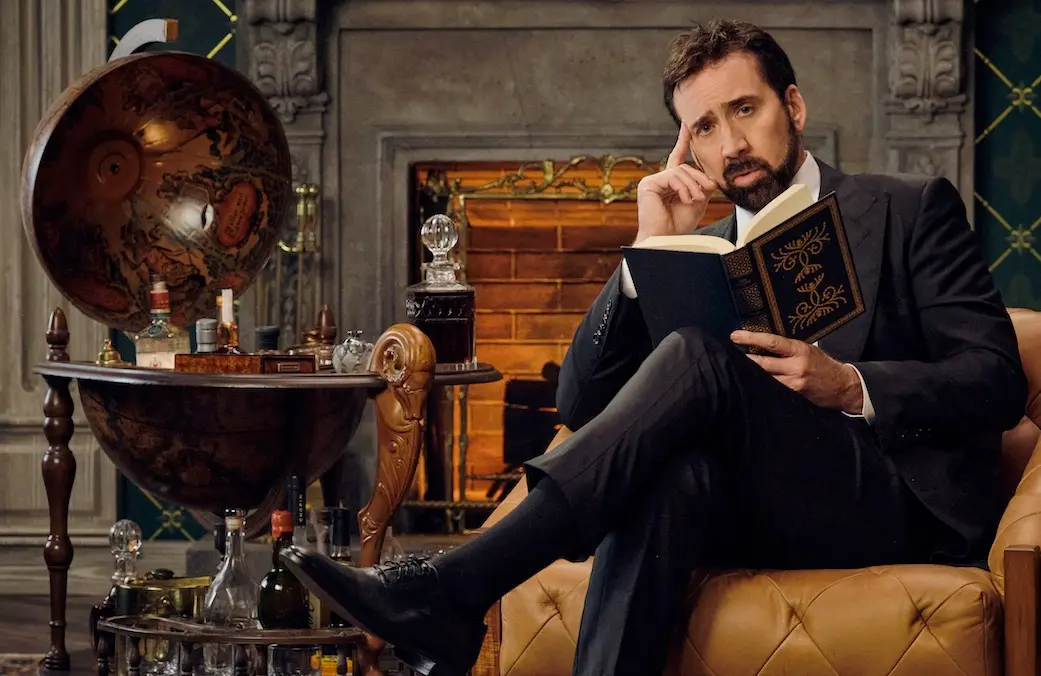Nicolas Cage Is Disturbingly Genteel in Netflix's History of Swear Words
-
 Nicolas Cage in History of Swear Words. (Netflix)
Nicolas Cage in History of Swear Words. (Netflix)We all know the whole Nicolas Cage deal by now. We may not understand it, but we certainly know it. He has been, at times, a world-class actor, winner of the 1994 Academy Award for his performance as a desperate alcoholic in Leaving Las Vegas (a turn which few dispute is a work of genius). He's excelled in films like Raising Arizona, Adaptation, and Bringing Out the Dead. He's also more often than not a wildly extravagant screen presence, practically re-defining our concept of over-the-top in movies like Vampire's Kiss and The Wicker Man. In the best cases, he combines the two, like in Moonstruck or Face/Off. His appeal is — no judgments made — a vulgar one. Which is likely why Cage felt like such a huge get to host Netflix's new documentary series History of Swear Words, a lighthearted, rather slight series of short docs about the histories of our most notorious curse words.
This of course raises the question: is Nicolas Cage our go-to actor when it comes to swear words? I'd say no, and History of Swear Words appears to agree. In its first episode, on the word "Fuck," Cage himself presents empirical data listing the five most curse-heavy performers in Hollywood, a list that includes usual suspects like Samuel L. Jackson and Al Pacino and is curiously topped by Jonah Hill (the incredulity over that designation is reflected in the show's talking-heads). So why is Cage the perfect performer to host such a show? Well, for one thing, it's not like he's a slouch when it comes to cinematic cursing. He's ranted and raved with the best of them. But more than that, it's that Cage's persona is so off-kilter and unpredictable that it matches the tone of a quasi-serious exploration about a most literally vulgar subject.
That's certainly what's at play here. Affecting a faux-genteel manner, Cage hosts the six-episode series from what appears to be the set of the old Masterpiece Theater. You know the vibe: armchair perpendicular to a roaring fireplace, a bar cart nearby with a tastefully decanted let's say brandy therein. The walls are lined with bookshelves, all leather-bound classics I'm sure. Cage himself is in a smoking jacket. It all feels like we're here to discuss Brideshead Revisited. But of course, we're not. We're here to break down the etymology of "shit." Which is what makes that chaotic gleam eternally behind Cage's eyes so appropriate. Because at any point, he's liable to break his Alistair Cooke impersonation and burst forth with some kind of expletive to punctuate a point. It's a ride, and we're all on it with him.
As for the series itself, it's cute, if basic. The six 20-minute episodes each take on a different curse word. They're not exactly all George Carlin's famous list of verboten verbiage, but there's some crossover: "Fuck," "Shit," "Bitch," "Dick," "Pussy," and "Damn." (Interestingly, and more than a little ironically, only "Bitch" and "Damn" are listed in Netflix's episode list uncensored.) Each one is worked over in a manner that's half intellectual and half tongue-in-cheek, with a collection of talking heads that span academics, lexicographers, the always-reliable stand-up comedians, and, where appropriate, some actors. Obviously you couldn't have an episode about the word "shit" without Isiah Whitlock Jr. reprising his famous one-word catchphrase from The Wire. Each episode gets into the etymology of the term, its evolution over the years, and its cultural context today. The comedians — and Cage himself — are usually down for some wordplay that showcases how many different ways these words can be used. Nearly all of these words have some bunk backstory about how it was originally some clever acronym that ends up being wholly false (no, "fuck" doesn't come from Fornication Under Consent of the King).
The gathered comedians are pretty funny — asides from Joel Kim Booster, Nikki Glaser, and Patti Harrison are standouts — and there's some interesting avenues about the MPAA, N.W.A.'s "Fuck Tha Police," how to contextualize "bitch" and who gets to do so, et cetera. But with only 20 minutes per episode, each discussion feels pretty surface level and slight. This all might have been conveyed more effectively in a feature-length documentary, but Netflix was clearly going for something bite-sized and snackable, and this indeed feels like the 20-calorie brownie bite of vulgarity docs.
Ultimately what's special about History of Swear Words is the presence of Cage himself, an incongruous yet strangely appropriate marriage of unhinged screen persona and quasi-serious exploration of social phenomena. Nicolas Cage himself is, in many ways, a quasi-serious exploration of social phenomena, so it works. But I still can't shake the unease I felt watching Cage act all genteel by a fireplace. It feels, well, fucked up.
History of Swear Words drops on Netflix January 5th.
Joe Reid is the senior writer at Primetimer and co-host of the This Had Oscar Buzz podcast. His work has appeared in Decider, NPR, HuffPost, The Atlantic, Slate, Polygon, Vanity Fair, Vulture, The A.V. Club and more.
TOPICS: History of Swear Words, Netflix, Isiah Whitlock Jr., Joel Kim Booster, Nicolas Cage, Nikki Glaser, Patti Harrison